#i have a dream
Text
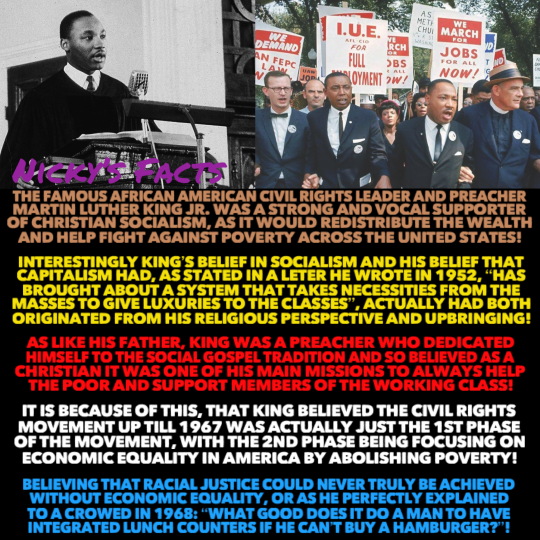
Martin Luther King Jr. was a Christian Socialist!
🕊️
#history#martin luther king jr#civil rights movement#christianity#social change#african american history#mlk day#historical figures#blm#i have a dream#socialism#american history#black tumblr#love not hate#role model#black lives matter#black excellence#black history#martin luther king day#social justice#1960s#united states#civil rights#nickys facts
144 notes
·
View notes
Text
imagine if richas gets a room in fobo. because I mean pepito did. and then what if chyanne and tallulah get one because what's going on with phil and tubbo is their god dad? like. this city of the future cowboys just becomes overrun with babies.
#qsmp#I have a dream#foolish and tubbo together#having such complex family lines#that will somehow connect#if sunny gets her way and tubbo adopts ramon asdfjladskf
24 notes
·
View notes
Text
My dream is to be able to animate like those homies that animated Kill la kill
Y’all see that shit?
It’s so fkn bouncy and goofy
(Think the studio also did lil witch academy)
25 notes
·
View notes
Text
wish i was a rich baron so i could be a patron of the arts™️and invite all ofmd fanartists to come live at my castle or whatever in exchange for pictures of ed and stede kissing filthy and cuddling in bed. is that too much to ask
#personal#ofmd#i have a dream#i'd also buy stede's wardrobe and get it tailored for myself and then i'd just walk around like that#and only drive a pristine jaguar e type roadster with red leather interior#except when i'm driving my horse carriage like a maniac#all rooms include sitting nooks only for sitting (art-ing allowed) and in the summer we wear big hats and have picnics by the lake#i walk from easel to easel with my hands behind my back and nod approvingly#someone falls in the water oh no! their secret love interest jumps in to save them. a mr darcy wet shirt moment ensues#we sit around the fireplace in the evenings and listen to the fanfic authors read their stories#sometimes we even have Visitors. they're intimidated#one room is just kittens#shall i go on#🐭📓
143 notes
·
View notes
Text
44 notes
·
View notes
Text

Behbeh
#Behbeh#mlk#mlk day#black history#civil reights#i have a dream#washington dc#american history#cartoon#memorial#mlk memoria#dailybehbeh#behbeh#cute#stuffed animal#art#history#polar bear
19 notes
·
View notes
Text




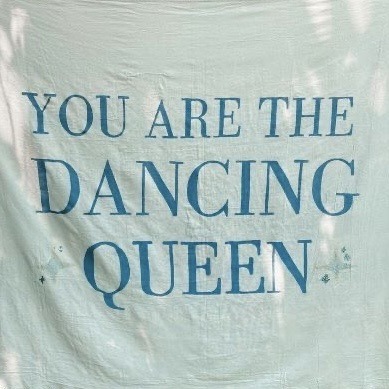




Mamma Mia! mood board
#mamma mia#mamma mia here we go again#abba#dancing queen#i have a dream#thank you for the music#money money money#the winner takes it all#waterloo#greece#voulez vous#donna sheridan#sophie sheridan#sam carmichael#harry bright#bill anderson#rosie mulligan#tanya chesham#sky#favorite movies#love this movie#mamma mia mood board#asethetic#greece asethetic
9 notes
·
View notes
Note
https://twitter.com/stopkookminpls/status/1712772202716610862?t=LkBM9euhw7UTJnYIRyIUEQ&s=19
Waiting for your view 🥹
There is nothing to say my lovely.
I just hope JK is taking care of himself and letting Jimin take care of him. And I hope he wraps up his work soon. And they can both walk together into the MS sunset.
Then they will serve... its all gonna go smoothly (In Jesus' name) Then they'll come back in 2025, group activities will pick up where they left off and Jikook antis gon get got.

33 notes
·
View notes
Text
MLK-I HaveADream
18 notes
·
View notes
Text
each week this month we’ve done a lesson on someone important in the civil rights era for black history month. today it was MLK JR and we learned about his dream for America and the world.
as a class we discussed our dreams for the world, with my example of: I have a dream that every child gets to grow up safe and healthy. And then I asked my class to tell me their dreams so they could draw them for me.
Mind you I teach four and five year olds. So we had some range, but this the best example of what that range was:
“I have a dream that everyone can have a miracle!” followed directly by “I have a dream that everyone can pet a pig!”
#i have a dream#martin luther king jr#the life and times of a pre-k teacher#daycare teacher#pre kindergarten
13 notes
·
View notes
Text
Look for the enemies of Medicare, of higher minimum wages, of Social Security, of Federal aid to education, and there you will find the enemy of the Negro, the coalition of Dixiecrats and reactionary Republicans that seek to dominate the Congress.
—A. Philip Randolph, speaking at The March on Washington 60 years ago
#prescient#a philip randolph#civil rights#dixiecrats#republicans#march on washington#i have a dream#living wages#social security#education#a. philip randolph
37 notes
·
View notes
Text
I just want Penn Badgley and Ed Speleers to have one (many) interview together and talk about the chemistry they had on screen, do it for the goldrose nation.
#you season 4#joe goldberg#jonathan moore#rhys montrose#GOLDROSE#penn badgley#ed speleers#i have a dream#PLEASE INTERVIEW
68 notes
·
View notes
Text
I have a dream:
I say to you today, my followers & friends…
Even though we may face difficulties knowing wtf certain wojaks are all about today and tomorrow, I still have a dream. It is a dream deeply rooted in cataloging the Wojaks.
I have a dream that one day the world will rise up and know the true meaning of lost and obscure wojaks that lurk around in the shadows of the internet.
We will hold these lost truths to be known and perhaps one day they will be self-evident. That all lost wojaks are found, and continue to be created & modified in open source and shared equally free on the internet.
I have a dream.
13 notes
·
View notes
Text

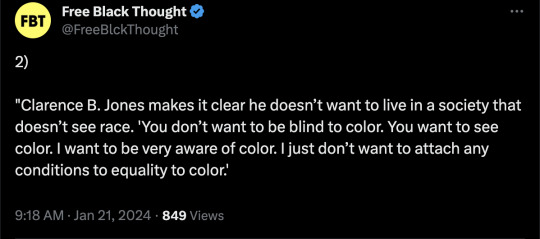
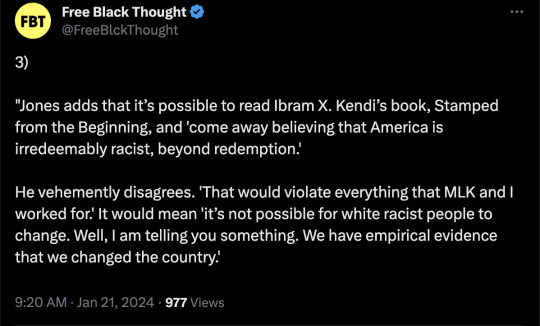
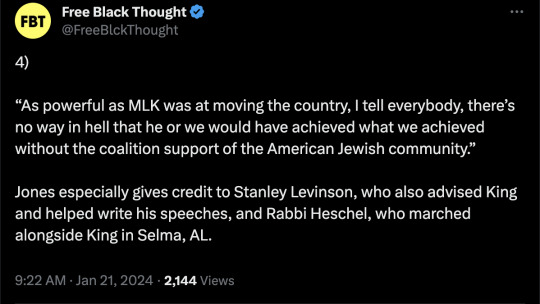


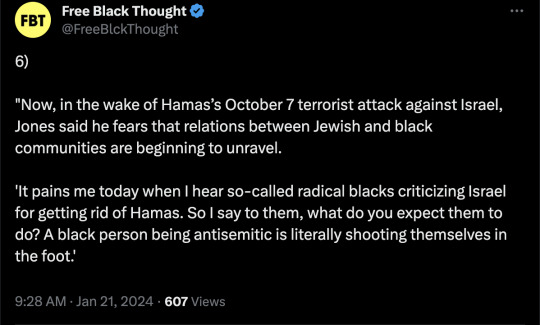
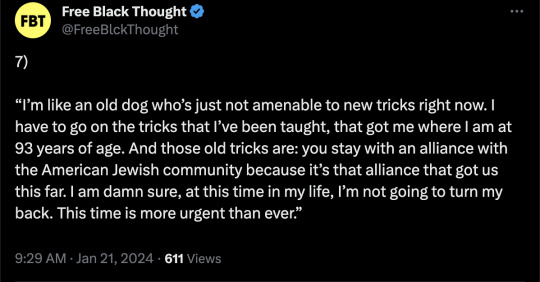
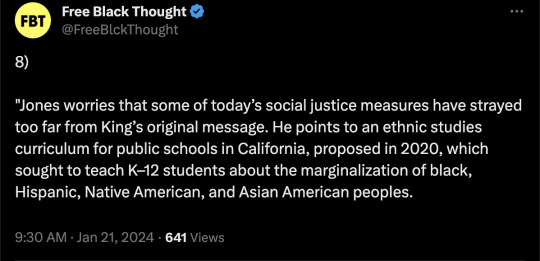

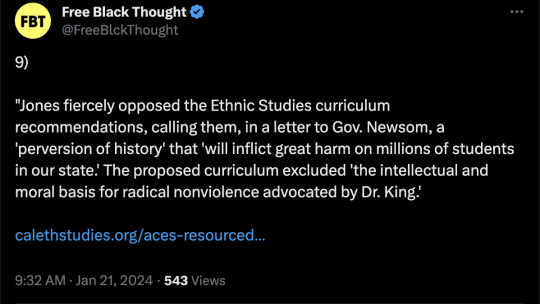
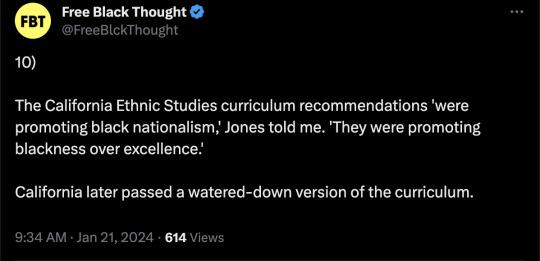

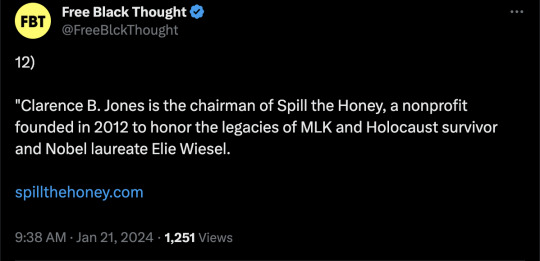
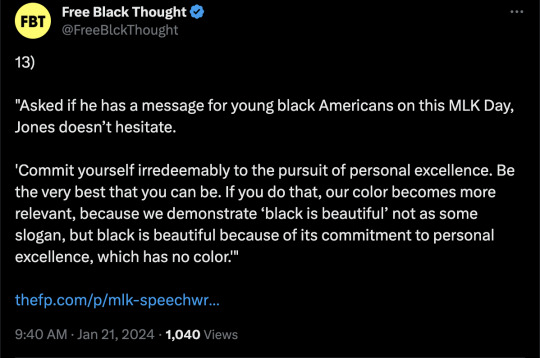
By: Francesca Block
Published: Jan 15, 2024
In the 1960s, when Clarence Jones was writing speeches for Martin Luther King Jr., he used to joke with the civil rights leader: “You don’t deserve me, man.”
“Why?” King would ask.
“I hear your voice in my head. I hear your voice in perfect pitch,” Jones would respond. “So when I write, I can write words that accurately reflect the way you actually speak.”
King would agree. “Man, you are scary. It’s like you’re right in my head.”
And Jones is still, in his mind, having conversations with his friend, who was assassinated at the age of 39 on a Memphis hotel balcony in 1968. Especially now, as America’s racial climate seems to have worsened, despite the fact that King successfully fought to ensure all Americans are given equal protection under the law, regardless of their skin color. A poll from 2021 shows that 57 percent of U.S. adults view the relations between black and white Americans to be “somewhat” or “very” bad—compared to just 35 percent who felt that way a decade ago.
Jones knows exactly what King would have felt about that. He says it out loud, and directs it to his late mentor: “Martin, I’m pissed off at you. I’m angry at you. We should have been more protective of you. We need you. You wouldn’t permit what’s going on if you were here.
“We are trying to save the soul of America.”
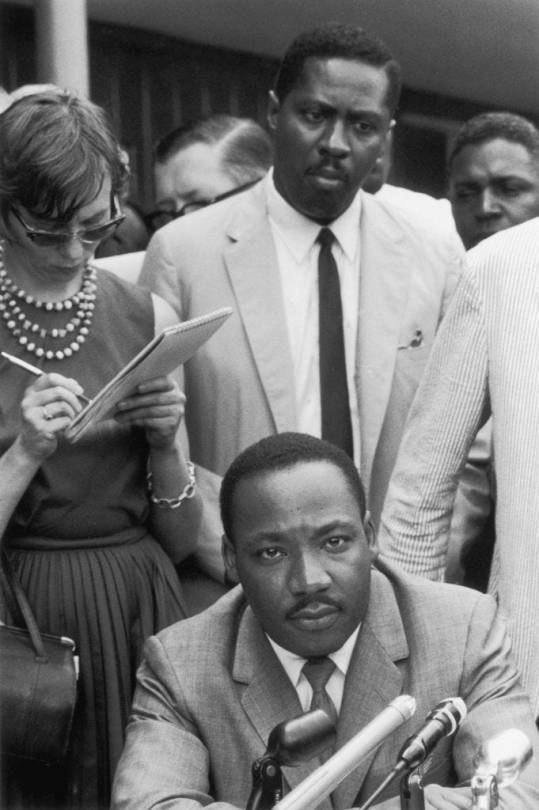
[ Jones, behind Martin Luther King Jr. in 1963, wrote: “I saw history unfold in a way no one else could have. Behind the scenes.” ]
I spoke to Jones, 93, two weeks ago as he sat on a beige couch in the humble second-floor apartment in Palo Alto, California, that he shares with his wife. A black-and-white close-up of King sits directly above his head, almost like a north star.
“Regrettably, some very important parts of his message are not being remembered,” Jones said, referring to King’s belief in “radical nonviolence” and his eagerness to build allies across ethnic lines.
“Put in a more negative way,” he added, King’s messages “have been forgotten.”
Jones was a young, up-and-coming entertainment lawyer when he first met King in February 1960. The preacher had turned up on the doorstep of his California home and tried to convince him to move to Alabama to defend him from a tax evasion case. But Jones wasn’t interested.
“Just because some preacher got his hand caught in the cookie jar stealing, that ain’t my problem,” he said in a talk, years later.
But King wasn’t one to give up easily. He invited Jones to attend his sermon at a nearby Baptist church in a well-to-do black neighborhood of Los Angeles. Standing at the pulpit, King spoke to a congregation of over a thousand people, delivering a message that seemed almost tailor-made for Jones.
Jones remembers King talking about how black professionals needed to help their less fortunate “brothers and sisters” in the struggle for equality. He realized, then and there, what an incredible speaker King was, and felt compelled to join his cause.
“Martin Luther King Jr. was the baddest dude I knew in my lifetime,” Jones says.
Jones moved down to Alabama to join King’s legal team. He helped free King of any charges in Alabama, and quickly became one of the leader’s closest confidants, and ultimately, his key speechwriter.
Jones refers to himself and King as “the odd couple,” because, he says, “we were so different.” King was the son of a preacher from a middle-class family in the South. Jones grew up the son of servants, raised by Catholic nuns in foster care in Philadelphia, who he credits with instilling in him “a foundation of self-confidence that was like a piece of steel in my spine.”
He said this confidence propelled him to graduate as the valedictorian from his mixed-race high school just across the border in New Jersey, and then on to Columbia University, where he earned his bachelor’s degree in 1953. After a brief stint in the army, where he was discharged for refusing to sign a pledge stating that he was not a member of the Communist Party, Jones enrolled at the Boston University School of Law, graduating in 1959.
Though Jones was mainly a background figure in the 1960s civil rights movement, it might not have been possible without him. He fundraised for King’s Southern Christian Leadership Conference so successfully that Vanity Fair later called him “the moneyman of the movement.” In 1963, when King was in prison, Jones helped smuggle out his notes, stuffing the words King scrawled on old newspapers and toilet paper into his pants and walking out.
Later, he helped string those notes together into King’s famous address, “Letter from Birmingham Jail,” which argued the case for civil disobedience, and was eventually published in every major newspaper in the country.
Jones then wooed enough deep-pocketed donors, including New York’s then-governor Nelson Rockefeller, to raise the bail needed to release King and many other young protesters from jail.
Jones also helped write many of King’s most iconic speeches—“not because Dr. King wasn’t capable of doing it,” Jones emphasized—“but he didn’t have the time.” Jones crafted the opening lines of King’s “I Have a Dream” speech from his D.C. hotel room on the eve of the 1963 March on Washington. In his book, Behind the Dream, he recounts how he penned their shared vision for a better nation onto sheets of yellow, lined, legal notepaper, many of which ended up crumpled on the floor.
But he didn’t write the most famous words: “I Have a Dream”—that was all King, his book notes. “I would deliver four strong walls and he would use his God-given abilities to furnish the place so it felt like home,” Jones writes about their speech-writing dynamic.
The day after he wrote that speech, Jones stood just fifty feet behind King as he delivered it to the hundreds of thousands gathered on the steps of the Lincoln Memorial. “I saw history unfold in a way no one else could have,” Jones writes. “Behind the scenes.”
The movement King led with Jones by his side helped achieve school integration, the Civil Rights Act of 1964, and the Voting Rights Act of 1965.
So, when asked if America has made any progress on race, Jones is dumbstruck. “Are you kidding?” he said, with shock in his voice. “Any person who says that to the contrary, any black person who alleges themselves to be a scholar, or any white person who says otherwise, they’re just not telling you the truth.
“Bring back some black person who was alive in 1863, and bring them back today,” he adds. ��Have them be a witness.”
But after the death of George Floyd in 2020, 44 percent of black Americans polled said “equality for black people in the U.S. is a little or not at all likely.” And “color blindness”—the once aspirational idea of judging people by their character rather than their skin color, which King famously espoused—has fallen out of fashion. The dominant voices of today’s black rights movement argue that people should be treated differently because of their skin color, to make up for the harms of the past. One of America’s most prominent black thinkers, Ibram X. Kendi, argues that past discrimination can only be remedied by present discrimination.
Jones makes it clear he doesn’t want to live in a society that doesn’t see race. “You don’t want to be blind to color. You want to see color. I want to be very aware of color.”
But, he emphasizes: “I just don’t want to attach any conditions to equality to color.”
He adds that it’s possible to read Kendi’s prize-winning book, Stamped from the Beginning, and “come away believing that America is irredeemably racist, beyond redemption.”
It’s a theory he vehemently disagrees with. “That would violate everything that Martin King and I worked for,” he said. It would mean “it’s not possible for white racist people to change.”
“Well, I am telling you something,” Jones adds. “We have empirical evidence that we changed the country.”
Jones is the first to admit King and his circle didn’t change the country on their own.
“As powerful as he was at moving the country, I tell everybody, there’s no way in hell that he or we would have achieved what we achieved without the coalition support of the American Jewish community.”
Jones especially gives credit to Stanley Levinson, who also advised King and helped write his speeches, and Rabbi Abraham Joshua Heschel, who marched alongside King in Selma, Alabama. He remembers being on the picket lines and talking to Jewish protesters who told him about their own families’ experiences in the Holocaust.
“There would have been no Civil Rights Act of 1964, no Voting Rights Act of 1965, had it not been for the coalition of blacks and Jews that made it happen,” Jones says.
Now, in the wake of Hamas’s October 7 terrorist attack against Israel, Jones said he fears that relations between the Jewish and the black communities in America are beginning to unravel.
He said he has seen how, days after the attack, college students—many of them black—marched on campus, chanting for the death of Israel.
“It pains me today when I hear so-called radical blacks criticizing Israel for getting rid of Hamas. So I say to them, what do you expect them to do?”
He continues: “A black person being antisemitic is literally shooting themselves in the foot.”
Long before October 7, Jones has proudly shown his allegiance to the Jewish people: a gold mezuzah—the small decorative case, which Jews fix to their door frames to bless their homes—is nailed outside his Palo Alto apartment.
“I’m like an old dog who’s just not amenable to new tricks right now,” Jones says. “I have to go on the tricks that I’ve been taught, that got me where I am at 93 years of age. And those old tricks are: you stay with an alliance with the American Jewish community because it’s that alliance that got us this far.
“I am damn sure, at this time in my life, I’m not going to turn my back. This time is more urgent than ever.”
Meanwhile, Jones worries that some of today’s social justice measures have strayed too far from King’s original message. He points to an ethnic studies curriculum for public schools in California, proposed in 2020, which sought to teach K–12 students about the marginalization of black, Hispanic, Native American, and Asian American peoples.
Jones fiercely opposed the new curriculum recommendations, calling them, in a letter to Governor Gavin Newsom, a “perversion of history” that “will inflict great harm on millions of students in our state.” He wrote that the proposed curriculum excluded “the intellectual and moral basis for radical nonviolence advocated by Dr. King” and his colleagues.
“They were promoting black nationalism,” he told me. “They were promoting blackness over excellence.”
California later passed a watered-down version of the curriculum.
At the same time, Jones feels more conflicted about affirmative action, a policy he believes was grounded in “the most genuine, the most beautiful, the most thoughtful” intentions, and that it helped to “accelerate the timetable. . . to truly give black people equal access.”
Even so, he is pragmatic about the Supreme Court’s decision to strike it down last year. “You had to stop the escalator somewhere.”

[ Jones is still working. He released his autobiography, The Last of the Lions, in August, and is now recording the audiobook. ]
In the immediate years after King’s death in 1968, Jones struggled to find a path forward. He was angry and even considered “taking up arms against the government,” which he blamed for allowing King’s death to happen.
For a while, Jones dabbled in politics—serving as a New York State delegate at the 1968 Democratic Convention—and then in media, purchasing a part of the influential black paper New York Amsterdam News. In 1971, he acted as a negotiator on behalf of some of the inmates behind the Attica prison uprising, unsuccessfully trying to seek a peaceful resolution.
But King’s voice—always in his head—eventually steered him back toward his original purpose.
A father of five, Jones lives with his wife, Lin, just a five-minute walk from the Stanford campus where he maintains an affiliation with the Martin Luther King, Jr. Research and Education Institute. In 2018, Jones co-founded the University of San Francisco’s Institute for Nonviolence and Social Justice to teach the lessons of King and Mahatma Gandhi “in response to the moral emergencies of the twenty-first century.”
He is also the chairman of Spill the Honey, a nonprofit founded in 2012 to honor the legacies of King and Holocaust survivor and Nobel laureate Elie Wiesel. And in August 2023, he released his autobiography, The Last of the Lions, so named because he is possibly the only member of King’s civil rights circle still alive. “There’s an African saying that I often reflect upon when I think about his legacy and my own part in his movement,” Jones writes in his book. “If the surviving lions don’t tell their stories, the hunters will take all the credit.”
Although the eight years he spent with King happened more than half a century ago, Jones told me he now sees his mission as clearly as ever. Asked if he has a message for young black Americans on this Martin Luther King Jr. Day, he doesn’t hesitate.
“Commit yourself irredeemably to the pursuit of personal excellence,” he says emphatically. “Be the very best that you can be. If you do that. . . our color becomes more relevant, because we demonstrate ‘black is beautiful’ not as some slogan, but black is beautiful because of its commitment to personal excellence, which has no color.”
==
What's going on now is what happens when activists and fanatics, such as frauds like Kendi and Nikole Hannah-Jones, construct history curriculum, not actual historians. If they teach the Jewish allyship with the Civil Rights Movements at all, it will be wrapped in conspiracy theory such as "interest convergence."
https://newdiscourses.com/tftw-conspiracy-theory/
This doctrine insists that white people (as the racially privileged group) only take action to expand opportunities for people of color, especially blacks (see also, BIPOC), when it is in their own self-interest to do so, and in which case the result is usually the further entrenchment of racism that is harder to detect and fight. Under interest convergence, every action taken that might ameliorate or lessen racism (see also, antiracism) not only maintains racism, but does so because it was organized in the interests of white people who sought to maintain their power, privilege, and advantage through the intervention.
One of the truly gross and despicable things about frauds like Kendi is that while he pulls every bogus fallacy to assert that nothing has changed - it's a tenet of Critical Race Theory that nothing has changed, racism has only gotten better at hiding itself and becoming more entrenched - his own success blows this conspiracy theory completely out of the water, given how fawning his acolytes are about his wildly overstated wisdom, and the number of white fans he's accumulated who masochistically want to be told how racist they are and how much they hurt black folk every single day.
That's not possible unless racism is both aberrant and socially and culturally unacceptable.
#Clarence B. Jones#Clarence Jones#MLK Day#MLK Jr Day#Martin Luther King Jr#Martin Luther King#Martin Luther King Day#i have a dream#Henry Rogers#Ibram X. Kendi#black nationalism#colorblindness#color blindness#colorblind#color blind#antiracism#antiracism as religion#antisemitism#am yisrael chai#pro palestine#pro hamas#islamic terrorism#israel#palestine#hamas terrorism#hamas war crimes#exterminate hamas#religion is a mental illness
10 notes
·
View notes
Text

#i have a dream#TELL ME UR DREAM#LETS ACHIEVE OUR DREAMS!!!!#TOGETHER!!!#vibes#opla#opla spoilers#bad op edit#luffys superpower is that when u meet him u are compelled to spill your dreams to him
22 notes
·
View notes
Text

A distraction ~
•••
At my grandma's so I don't think I'll post anything digital for a while
Enjoy some wandering eye tho
See I can draw other ships I'm not obsessed with deathglare *shoves all my aus under the bed*
•••
Without my shitty ibis paint coloring:

#woy#wander over yonder#commander peepers#wander#wandering eye#i have a dream#make all of the cast a poly#just one giant polycule#(except domi and sylv)#(theyre lesbians)
50 notes
·
View notes